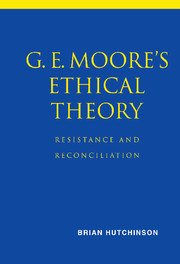Book contents
- Frontmatter
- Contents
- Introduction: Irony, Naïveté, and Moore
- 1 Simplicity, Indefinability, Nonnaturalness
- 2 Good's Nonnaturalness
- 3 The Paradox of Ethics and Its Resolution
- 4 The Status of Ethics: Dimming the Future and Brightening the Past
- 5 The Origin of the Awareness of Good and the Theory of Common Sense
- 6 Moore's Argument Against Egoism
- 7 The Diagnosis of Egoism and the Consequences of Its Rejection
- 8 Moore's Practical and Political Philosophy
- 9 Moore's Cosmic Conservatism
- 10 Cosmic Conservatism II
- Bibliography
- Index
5 - The Origin of the Awareness of Good and the Theory of Common Sense
Published online by Cambridge University Press: 28 July 2009
- Frontmatter
- Contents
- Introduction: Irony, Naïveté, and Moore
- 1 Simplicity, Indefinability, Nonnaturalness
- 2 Good's Nonnaturalness
- 3 The Paradox of Ethics and Its Resolution
- 4 The Status of Ethics: Dimming the Future and Brightening the Past
- 5 The Origin of the Awareness of Good and the Theory of Common Sense
- 6 Moore's Argument Against Egoism
- 7 The Diagnosis of Egoism and the Consequences of Its Rejection
- 8 Moore's Practical and Political Philosophy
- 9 Moore's Cosmic Conservatism
- 10 Cosmic Conservatism II
- Bibliography
- Index
Summary
The Origin of Our Awareness of Good
In the first part of this chapter, we examine Moore's views on the origin and development of our awareness of good and the way in which that awareness is connected to action by the will. We will see how Moore is able to allow that the commonsense awareness of good we bring to philosophical reflection is more provisional than one who only listens to him at his most stentorian would think possible. Though common sense leaves us with very strong beliefs about good and the goodness of certain things, since they are not grounded in sustained reflection, they are jumbled together and in fact, are likely to be inconsistent. These facts give ethics its job and the parameters within which to work. Although the beliefs left to ethics by common sense undergo a great deal of change as they are scrutinized, defended or discarded, and systematized, the general picture in ethics is one of refinement, not revolt: Too much change and we will have switched the subject. In the chapter's second part, we flesh out this conception by suggesting avenues of argument Moore incorrectly disallows himself that show how a commonsense awareness of such natural goods as health provide a guide to ethical reflection. In doing all of this for Moore, we make him less revolutionary and more appealing.
- Type
- Chapter
- Information
- G. E. Moore's Ethical TheoryResistance and Reconciliation, pp. 93 - 111Publisher: Cambridge University PressPrint publication year: 2001



